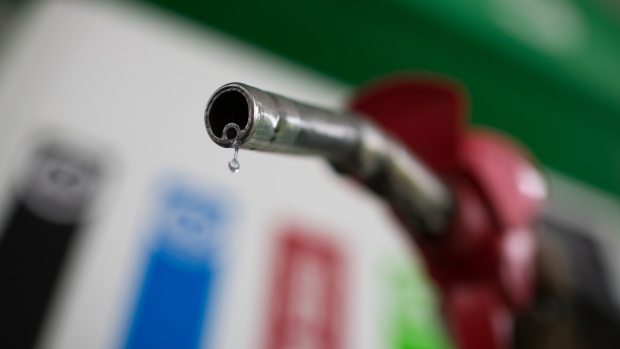Apr 26, 2019
Waiting for gas prices to fall?: ‘There’s no end in sight,’ experts say
, BNN Bloomberg

Those waiting for relief at the pumps should brace themselves for the exact opposite, according to experts who say it won’t just be the busy summer season, but also geopolitical factors that will push up gasoline prices significantly in Canada in the coming months.
Gas prices have shot up in Ontario, Manitoba, Saskatchewan and New Brunswick since the start of April with the introduction of the federal carbon tax – adding about 4.4 cents to the price of a litre of gas. Drivers in Eastern Canada were also hit with a seasonal price increase as gas stations switched from winter to summer gasoline.
This week, the Trump administration’s decision to end exemptions from sanctions for countries that import oil from Iran helped send crude prices to a six-month high. The move has heightened concerns about supply in an already tight global market hit by U.S. sanctions on Venezuela, production cuts by the Organization of the Petroleum Exporting Countries, and ongoing problems in another major global supplier – Libya.
From global supply constraints to local bottlenecks, here’s a look at the factors that will likely cause Canadian gas prices to spike further, experts say:
Global crude to push gas prices to ‘peak’ in July
Susan Bell, an oil analyst at IHS Markit, says she expects international factors will push up Canadian gas prices by another 10 cents per litre in the next three months before it peaks in July.
“Eastern Canadian refineries import foreign crude oil, so they are directly exposed to international crude oil prices,” Bell told BNN Bloomberg in an email interview. “Likewise, Eastern Canadian refineries export significant volumes of gasoline into the U.S. East Coast markets, so they are directly exposed to the U.S. gasoline market.”
In Western Canada, refineries process crude oil that's priced in the global market, so they have to respond to rising oil prices by adjusting gasoline and diesel prices, according to Bell.
The price of benchmark West Texas Intermediate (WTI) oil has jumped more than 45 per cent this year to around US$66 a barrel, similar to the price increase of Western Canadian Select (WCS) crude oil.
Bell points out that gas prices in most major cities, excluding Vancouver, are still lower than they were last year, because crude oil prices haven’t recovered to the levels seen in mid-2018. WTI hit a 2018 high of more than US$75 a barrel in October.
Refinery outages
Local factors such as refinery outages in North America also affect the price of gas, according to Bell, but even that impact is directly related to the action that refiners take in the global market to ensure adequate supply.
Roger McKnight, chief petroleum analyst at En-Pro International, said refinery runs – known as the utilization rate for production – in the U.S. West Coast are currently at 76 per cent. Until the rate returns to at least 80 per cent, gas prices will continue to climb, especially on the Canadian West Coast.
“There’s no end in sight. There’s only one pipeline that feeds anywhere west of the Rockies in the United States or Canada and that’s Mr. Trudeau’s Trans Mountain pipeline,” McKnight told BNN Bloomberg’s Andrew Bell in an April 18 interview.
“It would help if there was more capacity running through that Trans Mountain from Edmonton down to Burnaby, but then again, we’ve been waiting for years. We’ll probably wait a few more.”
Dan McTeague, senior petroleum analyst at Gasbuddy.com, said Canada’s inability to help ease an oil supply shortage in the global market will not help gas prices here.
“Canada’s not able to come to anyone’s rescue right now, because we have a habit in this country of blocking pipelines,” McTeague said in a phone interview.
“2019 could be the most expensive year to buy fuel in Canada, bar none, going back to 2014. This is really just a taste of what’s to come.”
Fallout from blocking Iranian oil
Experts said another problem on the horizon for the oil market is the threat of retaliation from Iran to the U.S. sanctions – such as blocking off access to the Strait of Hormuz – a key international trade route.
“The only card the regime has left to play is to block the straits. If that happens, then all bets are off,” said McTeague.
“There are too many geopolitical issues at play here. I don’t think a [Donald] Trump tweet saying, ‘Who doesn’t like the price of gasoline?’ is going to make one bit of difference this time.”




